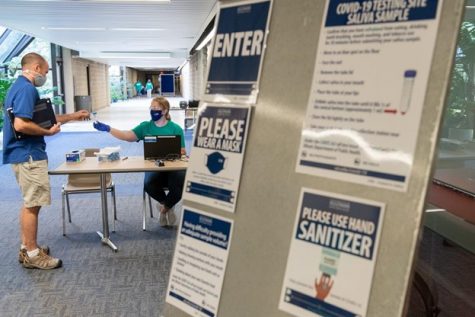Living through History: The Illinois House of Representatives

Photograph courtesy of www.ilhousedems.com
Photograph of Chris Welch
No one expected that the 2021 Illinois House of Representatives lame duck session would make history. This session was supposed to be a few days of passing important legislation. Yet, this lame duck session had many important and unusual highlights. This article will cover just a few events that occurred during this period that spanned from January 8 to January 13, 2021.
The session was slow to start, with the House of Representatives doing committee work and short floor sessions. With major work saved for last, the first big headline came when Representative Baily fainted during a floor session in the Bank of Springfield (BOS) Convention Center on January 10. Representative Bailey’s office made a press release on this topic, stating the following: “Rep. Bailey fainted but is now doing well and being treated at a local hospital. He is looking forward to returning to work as soon as possible.”
The weekend picked up steam the next day, with the House Democratic Caucus needing to choose the next Speaker of the House. Michael J. Madigan had been speaker for 36 years, and even with the recent ComEd scandal, many believed that he would still win reelection. That is why it was so surprising that he suspended his run for Speaker on January 11. While Madigan did not drop out of the race entirely, this concession was still an oddity.
On this same day, the House Judiciary Civil Committee met to discuss the COVID-19 outbreak in the LaSalle veterans’ home after 72 veterans living in state homes died. The director of the state’s Veteran’s Affairs Department, Linda Chapa LaVia, attended this subject matter committee. Director Chapa LaVia (formerly known as Democratic State Representative Chapa LaVia) came before the institution she once worked for to answer questions regarding these deaths. After providing answers deemed less-than-sufficient, representatives from the committee called for her resignation, which she gave shortly after the committee hearing.
Going back to the Speaker race, January 11 became an even bigger day. While candidates such as Ann Williams (who garnered 18 votes), Representatives Kathleen Willis (who eventually dropped out to back Williams) and Stephanie Kifowit had already come out to run against Madigan, a potential front-runner finally joined the game that Monday. The House Black Caucus nominated Representative Emmanuel “Chris” Welch, a known Madigan supporter and well-liked candidate by most of the party. Representative Jay Hoffman, a downstate Democrat, also joined the race. This meant the major contenders for Speaker of the House were Representatives Welch, Williams, and Hoffman.
Moving forward to January 13, the House of Representatives had to deal with House Bill 3653. This was the major criminal justice reform bill that had only been passed around at 4 a.m. by the Illinois State Senate prior to the swearing-in of the new General Assembly at noon. The bill covered many topics pertaining to police and criminal justice reform, such as ending cash bail, banning chokeholds and requiring body cameras. The bill passed the House, and the landmark legislation was sent to the Governor’s Office.
Finally, after the new General Assembly was sworn in on January 13, the nomination process for Speaker of the House began. Representative Welch was nominated by the Democrats, and Minority Leader Durkin was nominated by the Republicans. After a roll call vote, Representative Welch became the new Speaker of the House, bringing an end to the Madigan era in Illinois. Speaker Welch is the first Black Speaker of the House in Illinois history, showcasing the evolution of the Democratic party. Hopefully, the leadership team he chooses in the following days will represent the diverse caucus who voted for him.











